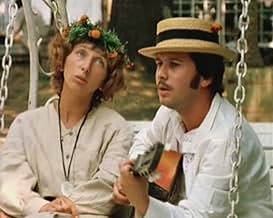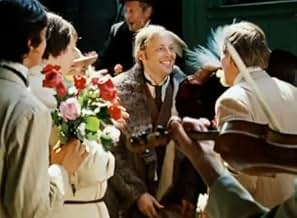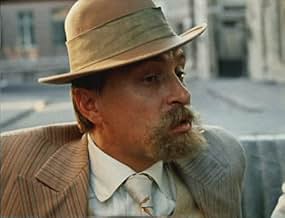NOTE IMDb
7,3/10
1,9 k
MA NOTE
Ajouter une intrigue dans votre langueA fate of popular film actress during the turbulent years of the Russian Civil War.A fate of popular film actress during the turbulent years of the Russian Civil War.A fate of popular film actress during the turbulent years of the Russian Civil War.
- Réalisation
- Scénario
- Casting principal
- Récompenses
- 1 victoire et 2 nominations au total
Konstantin Grígoryev
- Nikolay Fedotov
- (as Konstantin Grigorev)
Vera Kuznetsova
- Lyubov Andreyevna
- (as V. Kuznetsova)
Inna Ulyanova
- Aktrisa s buketom alykh poz
- (as I. Ulyanova)
Vitaliy Komissarov
- Assistent operatora
- (as V. Komissarov)
Nikita Mikhalkov
- Ivan
- (as N. Mikhalkov)
Nikolai Pastukhov
- Stsenarist
- (as N. Pastukhov)
Gotlib Roninson
- Ivan Figel
- (as G. Roninson)
Evgeniy Steblov
- Lyosha Kanin
- (as Ye. Steblov)
Mikhail Chigaryov
- Vyalin
- (as M. Chigaryov)
Aleksandr Yakovlev
- Sasha
- (as A. Yakovlev)
Aleksandr Adabashyan
- Rezhisyor nemogo kino
- (as A. Abadashyan)
Tatiana Andrianko
- Katyusha
- (as Tanya Sverchkova)
Yuriy Bogatyryov
- Vladimir Maksakov
- (as Yu. Bogatyryov)
Avis à la une
The good old Mikhalkov-Adabashian-Lebeshev trio means that you get expert - and a bit Western- directing, masterly done design and great camerawork. The cast is superb. There is a great deal of suspense in this movie although the counter-espionage is a mere backdrop for a more reflective look at human nature during the trials and tribulations of love and war.
it is one of Mikhalkov great titles. beautiful, melancholic, seductive. picture from old photo-album. part of a Rusian manner to discover the challenges of history. a film team. the Revolution. and a love story. extraordinary music. and political correct message. in fact, isles of delicate poetry. at first sigh, it is a picture by Seurat. because , not only the atmosphere but the crumbs of reality behind gestures/words of characters transforms the film in a collection of dots of pure color. indeed, it is director spirit, exercise to save traces of lost Russia but, in same time, homage to first steps of cinema.and the performance of Elena Solovey remains touching soul of this remarkable movie . because, more than a film, it is question, basic question in gloomy times - who is the duty of artist in the clash of worlds ? the answer is out of film.
Well-acted, nicely photographed, believable, this near-melodrama is remarkable for its comparatively realistic portrayal of character and personality on each side in the Russian Civil War (which immediately followed the second Russian Revolution, Lenin's Bolshevik take-over in the Autumn of 1917). See it, though, not so much for a surprising insight into crumbling Soviet ideology in 1976 (so early!) as for a very human, very touching love story.
This movie performed a miracle - it captured a mood, an atmosphere so raw, full, that you are feeling the stuffy summer air, the slow dusty wind, candy-sweet smell of southern flowers in a hot small Krimean town. The fact that the revolution is coming closer makes it eary and subtly frightening, as if you know that there`s a needle in someone`s bouquet of camelias.
The acting is done in a way that you can`t believe it is not documentary, but film frames are like a picture frames, they airy and weightlessly capture fading scenes of decadent beauty. Then the violence comes and awakens the characters, they are silly,comical and immensely tragic at the same time.But even the shootings and some real documental footage don`t brake the atmosphiere, it only changes, darkens, like before the storm. All of it is symbolically captured in a scene in the garden, when the operator is trying to tell Olga that the old life is stale, unjust, senseless, the rush of wind runs over the park growing in strength along with the monologue. But she does not understand him, she thinks he`s just jealous and laughs in ignorance of the storms to come.
The acting is done in a way that you can`t believe it is not documentary, but film frames are like a picture frames, they airy and weightlessly capture fading scenes of decadent beauty. Then the violence comes and awakens the characters, they are silly,comical and immensely tragic at the same time.But even the shootings and some real documental footage don`t brake the atmosphiere, it only changes, darkens, like before the storm. All of it is symbolically captured in a scene in the garden, when the operator is trying to tell Olga that the old life is stale, unjust, senseless, the rush of wind runs over the park growing in strength along with the monologue. But she does not understand him, she thinks he`s just jealous and laughs in ignorance of the storms to come.
A fascinating film not only about the making of a silent film in Revolutionary Russia, but by extension, about the inability of humans to see beyond their primary interests, to ignore the wave of history until it all but sweeps over and engulfs them.
To a viewer accustomed to linear storytelling and sophisticated technique, this helter-skelter development of a love story between a somewhat scatterbrained actress and her quietly subversive cameraman may seem disjointed until the revolutionary movement intrudes and the violence of history intrudes into their country dream. Slave to Love is an odd little film, an immersion into the myths of another country, and while I wouldn't watch it twice, it's sincerity of purpose is evident.
To a viewer accustomed to linear storytelling and sophisticated technique, this helter-skelter development of a love story between a somewhat scatterbrained actress and her quietly subversive cameraman may seem disjointed until the revolutionary movement intrudes and the violence of history intrudes into their country dream. Slave to Love is an odd little film, an immersion into the myths of another country, and while I wouldn't watch it twice, it's sincerity of purpose is evident.
Le saviez-vous
- AnecdotesJack Nicholson and Monte Hellman praised "Slave Of Love" highly and actively tried to get more people to see it.
- ConnexionsFeatured in Circulez y a rien à voir! (1983)
Meilleurs choix
Connectez-vous pour évaluer et suivre la liste de favoris afin de recevoir des recommandations personnalisées
Détails
Contribuer à cette page
Suggérer une modification ou ajouter du contenu manquant

Lacune principale
By what name was Esclave de l'amour (1976) officially released in India in English?
Répondre



































